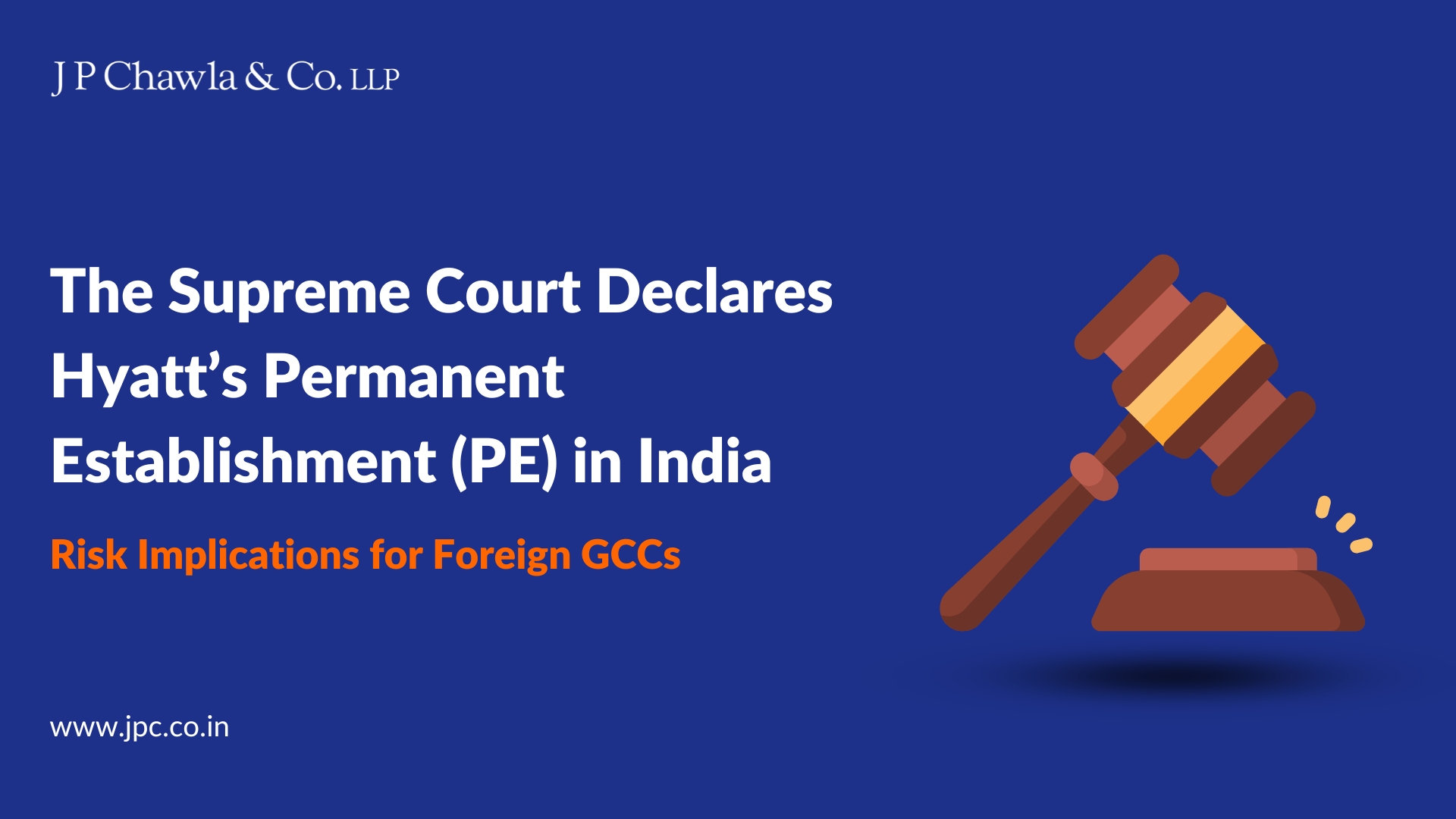- 11 August 2025
- Posted by: Admin
- Category: Legal & Regulation

For multinational companies operating Global Capability Centres (GCCS) in India, intensified scrutiny is the new name of the game. In a landmark judgment by the Supreme Court (SC) of India involving Hyatt International Southwest Asia Ltd; the court came heavily in favour of the Department of Income Tax. In its judgment, the Court laid down important principles/aspects in the context of Permanent Establishment (‘PE’) under India-UAE Double Taxation Avoidance Agreements (‘DTAA’).
While the decision will undoubtedly have a lasting impact on Hyatt’s operations in India, the blowback to multinationals operating Global Capability Centres (GCCs) is severe. The judgement sets a new precedent while interpreting the concept of PE when it comes to detailed scrutiny of “control,” “strategic decision-making,” and “operational authority” for foreign entities rendering managerial and consultancy services in India.
Understanding the Background of the Hyatt Case
To understand the case better, it’s important to take a step back and understand the background of Hyatt International (Southwest Asia) Ltd. operations in India. The company [incorporated in the UAE] did not have any office or legal entity registered in India. Overtime, they entered into management and consultancy agreements, otherwise known as Strategic Oversight Services Agreement (SOSA,) with various Indian hotel operators. Under these agreements, Hyatt provided services such as branding and marketing under the “Hyatt” name, operational and managerial guidance, and consultancy on staffing, quality standards, and financial planning.
These services were delivered partly through Indian-based employees and partly through visits by Hyatt executives from abroad. Importantly, the hotel properties themselves were owned and operated by Indian companies, not by Hyatt.
Hyatt Ruling: Beyond Advisory Role to Operational Control
At the heart of the Supreme Court’s ruling was the SOSA – which, as the Court observed; while structured as a service agreement, Hyatt exercised substantial and continuing control over the hotel’s day-to-day operations, ranging from HR and marketing to financial decisions and employee deployment. Critically, the agreement allowed Hyatt to assign its own personnel to Indian hotel premises and control over major operational elements without needing prior owner consent.
The Supreme Court concluded that:
- The assessee’s role exceeded mere strategic input and became integral to core operations.
- The hotel premises were effectively “at the disposal” of Hyatt, satisfying the OECD’s “disposal test.”
- The nature of remuneration (strategic fees based on hotel revenues and profits) further reflected deep commercial engagement rather than passive advisory functions.
The ruling underscores a substance-over-form approach to the PE test—emphasizing actual control and commercial presence over the contractual labels used.
What this means for GCCs in India?
This ruling is a wake-up call for foreign companies rendering management, technical, or consultancy services in India through expatriates, consultants, or representatives. While earlier interpretations often required a company to have a physical office, legal registration, or long-term presence in India to be taxed here; the Court has now emphasized that what really matters is how the business actually operates on the ground, not how it is structured on paper.
For the over 1,600 GCCs serving as the operational backbone for global businesses in sectors like IT, finance, logistics, analytics, and e-commerce, this serves as a major shift in economic realities.
The Hyatt ruling emboldens this line of questioning. In the context of GCCs:
- Strategic Oversight: If foreign headquarters are directing Indian employees on client engagements, pricing, R&D priorities, or even product decisions, this may mimic Hyatt’s strategic role.
- Employee Control: Where India-based teams are executing key deliverables under remote guidance, or even finalizing contracts or client deliverables, the Indian unit risks being viewed as a dependent agent PE or a fixed place PE.
- IP & Value Creation: A significant flashpoint is around ownership of intellectual property. If Indian personnel are materially involved in the development or management of IP (e.g., in tech or software), the argument that IP is owned abroad may be challenged.
- Substance vs. Form: Even without formal authority to bind contracts, the economic substance—such as routine approval of global decisions by Indian staff—can lead to PE attribution.
Takeaway for GCCs in India
- Review Agreements and SOPs: Contracts that confer operational authority, even indirectly, need to be revisited to avoid PE implications.
- Document Real Substance: Indian entities must document the limits of their operational role, ensuring it aligns with their TP characterization as low-risk service providers.
- Functional Analysis Must Be Deep: FAR (Functions, Assets, Risks) assessments must be updated in line with actual operational realities—not just stated corporate policies.
- Watch Remote Supervision & Digital Presence: Even without a formal office or long-term stay, digital supervision and intermittent visits can cumulatively support a PE finding.
Final Thoughts: Substance Will Prevail Over Form
For multinationals leveraging India’s talent pool through GCCs, the era of “safe” cost-plus structures may be nearing its end. It is now imperative to reassess business models and documentation in light of this evolving PE doctrine. With the concept of PE further evolving towards substance-over-form, businesses must adopt a proactive approach to legal, fiscal, and structural planning.
What’s more, with the likelihood of retrospective scrutiny, foreign entities must be ever-vigilant to India’s growing aggressive tax enforcement posture. The days of NOT engaging legal and tax advisors at the structuring stage, ensuring policy documentation, and preparing for litigation contingencies – are truly long-gone.
